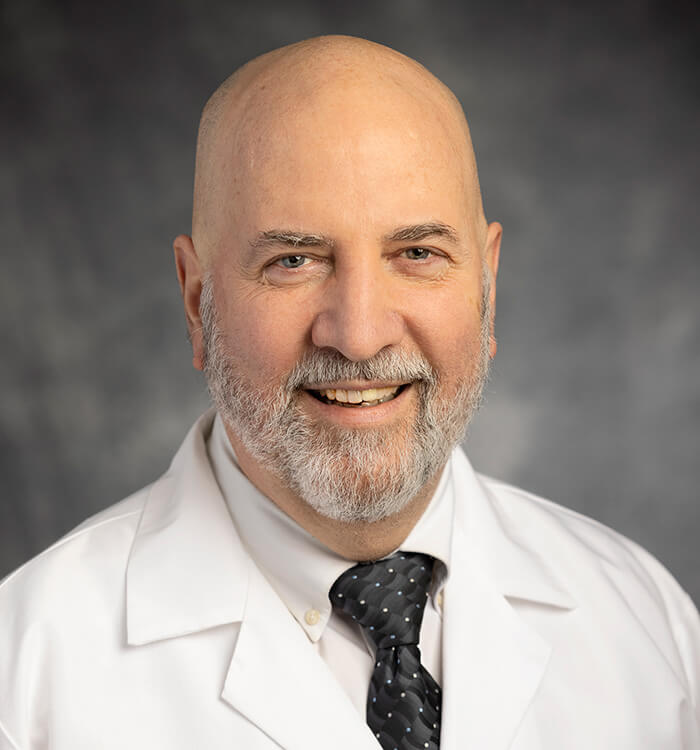Esteemed Alzheimer’s Researcher Joins University Hospitals
May 03, 2022
UH uniquely positioned to contribute to “war on neurodegenerative diseases,” he says
UH Clinical Update | May 2022
Neurologist and Alzheimer’s researcher Charles Duffy, MD, PhD, has long admired the Brain Health and Memory Center within the University Hospitals Neurological Institute.
 Charles Duffy, MD, PhD
Charles Duffy, MD, PhD“The Brain Health and Memory program is a well-known spectacular program for the diagnosis, care and research of dementia and all of its varieties, Alzheimer’s of course being the most prevalent one,” he says.
So when the opportunity arose for Dr. Duffy to join the Center as part of a leadership transition, he didn’t hesitate.
“Dr. Alan Lerner has built this program,” he says. “There was an appropriate initiative to find someone who could first understand the mission and operations of the program and be prepared to step into the role of director. The main goal is to make sure that we keep the ball rolling. It's a program that has achieved an enormous amount and it very much that seems could do even more. We want to first of all make sure that we don't miss a beat, should Dr. Lerner make the decision to retire.”
Dr. Duffy joins UH from Penn State Hershey Medical Center, where he served since 2019. Prior to that, he spent 26 years at the University of Rochester Medical Center, working in the Strong Epilepsy Center, Epilepsy Monitoring Unit, Geriatric Neurology and Psychiatry Clinic and Cognitive Neurology Clinic. During his distinguished career, Dr. Duffy has had research funding from the National Institutes of Health (NIH), both the National Eye Institute and National Institute on Aging, and has served on numerous NIH grant review panels.
In his new role at the UH Neurological Institute’s Brain Health and Memory Center, Dr. Duffy says his main goal is to continue the remarkable progress the Center has achieved and position it for growth as the number of patients suffering from Alzheimer’s and other dementias continues to grow. Supporting research currently under way and encouraging more is a key priority, he says.
“There are a tremendous number of researchers in the University Hospitals community who I’ve been excited to meet,” he says. “They have great, interesting ideas. We want to be a resource for facilitating and building and testing those ideas at every opportunity, to contribute to programs here but also contribute to the international effort to develop effective treatments for Alzheimer’s that so devastates lives.”
Dr. Duffy also plans to continue his own Alzheimer’s research at UH. His specific focus is understanding brain signal processing and how that affects the metabolism of brain cells, especially in the back half of the brain where most Alzheimer’s changes occur.
“This process sets off a sequence of events that mark the fateful transition from healthy aging to something like Alzheimer’s disease,” he says. “It can lead to brain cells’ functional decline and eventually cell death.”
He uses visual changes in Alzheimer’s as a window into understanding the more global brain changes associated with the disease.
“A great deal of the back half of the brain is visual processes of many different types,” he says. “Understanding how aging changes that helps us understand what might be triggering the transition from healthy brain aging to Alzheimer’s disease. We have found some real changes in how people process visual information and how the brain responds to information that may be a critical stressor on brain function that could in some ways ‘burn out’ processing capacity. That would spread like a fire to the brain and create what we see as Alzheimer’s disease.”
As he gets settled at the UH and the Brain Health and Memory Center, Dr. Duffy says he continues to be energized by both the rewards and challenges of caring for Alzheimer’s patients. Each patient and family is a unique case with unique needs, and should always be treated as such, he says.
“Alzheimer’s is not just one thing; it’s many different things,” he says. “It looks many different ways, which is both a diagnostic challenge and a therapeutic challenge because what is working for one individual is not necessarily going to work for others. Because it’s progressive, it’s also a moving target. What works this year may not work next year. You have to keep up to date, be involved and see people regularly and be available so that you can stay ahead of problems that can emerge.”
As much as research and science play into a patient’s course of treatment, Dr. Duffy says an equally important aspect is simply providing patients with compassionate support, guidance and advice when issues emerge that don’t respond to treatment.
“That’s also a specialty we have,” he says. “Part of what we do every day is helping people have reasonable, appropriate expectation about themselves and the course of their disease. We think about it as medical care. Part of it is medicine, but part of it is also just caring for people.”
Dr. Duffy says he’s encouraged by the progress that is being made against Alzheimer’s at places like UH and elsewhere. But he says much more can be done. He envisions a “war on neurodegenerative diseases,” similar to the approach that has been taken with leading causes of death like heart disease and cancer.
There's a process by which medicine evolves, and we need to work that process,” he says. “We can conquer what previously thought was unconquerable.”


